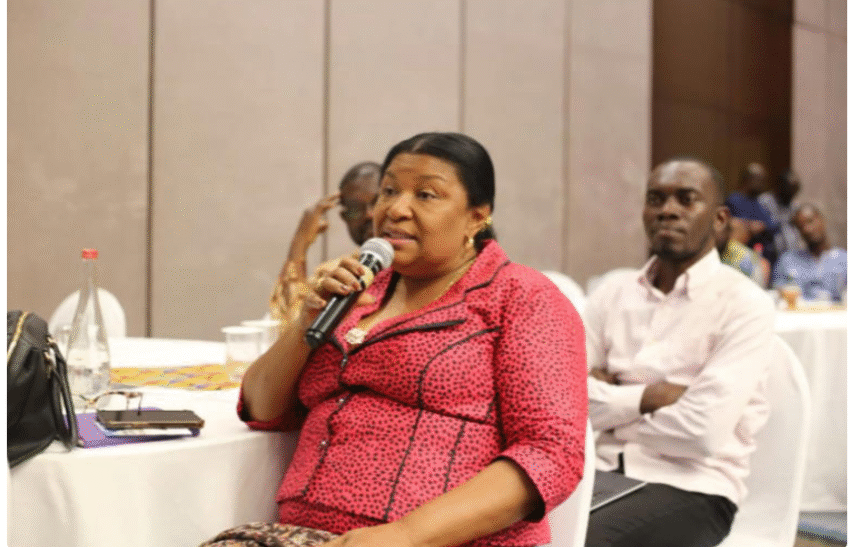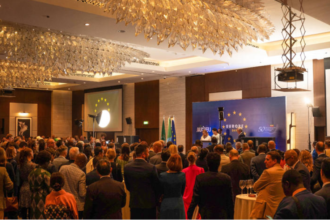By Abu Hassan
ACCRA, GHANA – Ghana has significantly advanced its capacity in sustainable construction, standardization, and innovation thanks to a growing partnership between Ghanaian and German institutions, according to Dr. Norbert Schultes, Head of the National Contact Point for Twinning, TAIEX and Institutional Partnerships.
Speaking at a recent Symposium on Science-Based Innovation for Robust Construction Materials in Ghana, themed “Accelerating National Development of Quality Construction through Standardization and Quality Assurance Processes,” Dr. Schultes highlighted the fruitful collaboration between Ghana’s Ministry of Trade, Agribusiness, and Industry, the Ghana Standards Authority (GSA), and the German Federal Ministry of Economic Affairs. He emphasized that this partnership has laid a strong foundation for long-term collaboration between Ghanaian and German institutions.
The partnership includes collaborations with key German entities such as DIN (the German Standardisation Body), DIBt (the German government authority on the construction sector), and PTB (the German national metrology institute). This institutional partnership allows government agencies to work together on a peer-to-peer basis, enhancing institutional set-up and knowledge sharing.
“Instead of using external consultants, we enable government officials in the different agencies to speak with each other and learn from each other,” Dr. Schultes explained, highlighting the efficacy of this approach. Currently, there are only eight such partnerships across the world.
The primary objective of the partnership with Ghana is to strengthen the country’s public testing laboratories in the construction materials and chemicals sector, particularly focusing on improving standards in sustainable cement binders and organic chemical admixtures for concrete. The collaboration aims to enhance testing standards, promote sustainable construction practices, and foster innovation through technical collaboration and capacity building.
Dr. Schultes emphasized the importance of stringent safety standards within the booming construction industry. “Construction is relevant to people’s health and safety. If the products on the market do not meet reasonable safety standards, the booming construction business turns into the opposite and harms society,” he warned.
Over the course of the partnership, significant progress has been made in upgrading laboratory infrastructure, developing training programs, and enhancing standardization processes. Key equipment, including fume hoods, platinum crucibles, and hot plates, have been procured, and GSA staff have received hands-on training in Germany. The project has also supported discussions on performance-based standards for cement and chemical admixtures, and the adoption of cement standards that allow for clinker substitution and the use of calcined clay. The ultimate goal is to position GSA as a leader in regional standardization.
Furthermore, the partnership emphasizes inclusive development, with initiatives like Girls STEM Day and gender equity workshops to promote women in science and engineering. A “Practical Handbook for Safe, Smart, and Durable Construction in Ghana” has been developed to guide safe and sustainable practices, particularly for informal construction artisans and workers. The project is also exploring digital quality control systems and the use of local materials like calcined clay in cement production.
Prof. Alex Dodoo, Director-General of the Ghana Standards Authority, stressed the importance of robust quality assurance processes accompanying standardization. “Construction is not just about cement, steel, and concrete—it is about trust,” he stated. “It is about guaranteeing that our infrastructure can stand the test of time, climate, and human usage.”
Prof. Dodoo reaffirmed the GSA’s commitment to ensuring that construction materials conform to both national and international standards, fostering investor confidence, improving public safety, and driving innovation. He praised the strategic international partnerships with Germany, particularly with institutions like BAM (Federal Institute for Materials Research and Testing), for supporting scientific innovation, technical training, and policy alignment in quality infrastructure.
“With support from the German Government and platforms like Twinning and TAIEX, we have seen the cross-pollination of ideas and methodologies that raise the bar for construction quality in Ghana,” Prof. Dodoo concluded.









